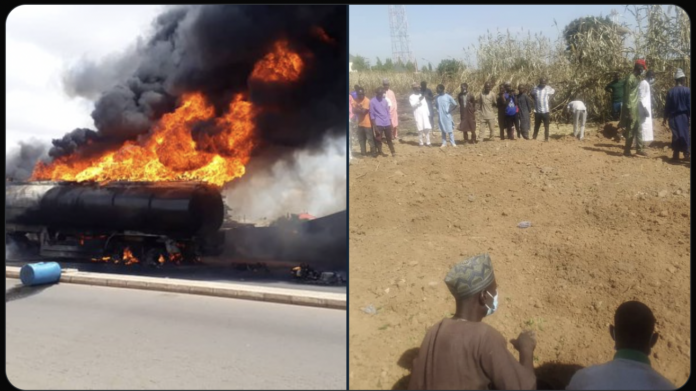A tragic tanker explosion has shaken the small town of Majia in Taura Local Government Area, Jigawa State. The disaster, which occurred on Tuesday night, claimed 94 lives and left 50 others injured. Families are mourning, while the nation grapples with another fuel-related disaster.
The explosion happened late at night, around 11:30 pm, when a petrol tanker carrying fuel from Kano to Nguru in Yobe State lost control and overturned near Khadija University. The tanker, heavily loaded with petrol, spilled its contents, triggering a chain of events that would end in catastrophe.
As news of the accident spread, local residents rushed to the scene to scoop the spilled fuel. Despite the well-known dangers, people were desperate to collect what they could, a practice that has sadly become common in many parts of Nigeria. Tragically, their efforts turned fatal when the tanker exploded, igniting a massive fire.
Police authorities confirmed the disaster in a statement on Wednesday. The Police Public Relations Officer for Jigawa State, Mr. Shi’isu Adam, shared the details of the horrific event.
“The tanker driver, Yusuf Mohammed, lost control of the vehicle, and it crashed in Majia town,” he said. “Unfortunately, despite warnings, people gathered around the tanker to scoop fuel. That’s when the explosion happened, causing a high number of casualties.”
The aftermath was devastating. Ninety-four people died in the explosion, many of them instantly, as they were engulfed by the fire. Another 50 people were severely injured and rushed to Ringim General Hospital and Hadejia General Hospital for treatment. The local community is overwhelmed with grief as they try to comprehend the scale of the loss.
Eyewitnesses recounted the tragic moments after the tanker crashed. One local resident described the scene: “People came running with containers, trying to gather the fuel. We warned them, but they didn’t listen. Suddenly, everything went up in flames.”
Despite repeated warnings from authorities over the years, fuel scooping remains a dangerous yet common practice in many rural areas of Nigeria. Desperate for fuel, people rush to scenes of accidents without considering the risks. Unfortunately, these scenes often turn deadly.
“We have always warned people to stay away from such scenes,” Mr. Adam said. “Yet, they ignored the warnings, and this led to a great loss of life.”
On Wednesday morning, the town of Majia gathered for a mass burial to lay the victims to rest. The scale of the tragedy was evident as mourners from across the town and nearby communities joined the solemn event. Many families are struggling to come to terms with their loss.
The Jigawa State Police, along with other emergency responders, have been working tirelessly to manage the aftermath. From recovering bodies to assisting the injured, they have been on the ground since the disaster unfolded. The scene of the explosion is a grim reminder of the dangers that come with fuel transportation and the desperate measures people take to access fuel.
In a statement, Jigawa State Commissioner of Police, Mr. A.T. Abdullahi, expressed his deepest condolences to the people of Majia and Jigawa State. He urged citizens to avoid approaching fuel tankers involved in accidents, stressing the explosive dangers of petrol.
“This is a very sad day for Jigawa State,” Abdullahi said. “Our thoughts are with the families who have lost loved ones. We cannot stress enough the dangers of approaching a fuel tanker accident. The risk of explosion is always high, and people must stay far away to avoid such terrible incidents.”
The practice of fuel scooping, while dangerous, has become a reflection of the struggles many Nigerians face in accessing fuel. In rural areas where fuel shortages are common, the temptation to scoop fuel from accident scenes often leads to deadly outcomes. Despite numerous disasters in the past, the practice continues.
Fuel tanker explosions have plagued Nigeria for years, with similar tragedies occurring in other parts of the country. In 2019, a petrol tanker explosion in Benue State killed more than 50 people. The year before, an explosion on the Lagos-Ibadan expressway claimed the lives of 12 people.
Experts and safety advocates have repeatedly called for stricter enforcement of fuel transport safety regulations. They also stress the need for public education to prevent people from gathering at accident scenes to scoop fuel.
Reacting to the Jigawa disaster, President Bola Tinubu expressed deep sorrow over the loss of lives and called for a thorough review of Nigeria’s fuel transportation safety protocols. In a statement delivered by Vice President Kashim Shettima on Wednesday, the President conveyed his sympathies to the affected families.
“My heart aches for those who have had their families torn apart by this disaster,” Shettima said. “This devastating incident has shaken us all to our core. The Federal Government stands with the people of Jigawa. We are mobilising all necessary resources to support the injured and assist the families affected by this calamity.”
The Vice President also announced that the National Emergency Management Agency (NEMA) would be deployed to assist in the recovery efforts and provide support to the victims.
“As we contend with this tragedy, let us also reflect on the importance of safety measures and public awareness to prevent such incidents in the future,” Shettima urged.
“Every life is precious, and we must do all we can to protect our citizens.”
The President also emphasized the need for stricter safety regulations in fuel transportation and called on Nigerians to heed warnings in dangerous situations, especially around fuel-laden tankers.
Vice President Shettima praised the quick response of emergency personnel and medical staff, whose efforts saved many lives.
“The dedication of our first responders and medical personnel during this crisis exemplifies the best of our nation’s spirit,” he said.

